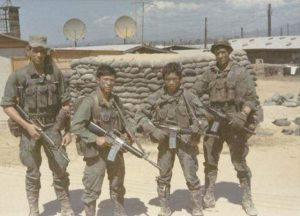
Street view of old town in Naples city, italy Europe
Happiness isn’t easily defined, because that sense or feeling we call happiness can come from many things. But in human terms and within the finite limits of our temporal reality, the kind of happiness that carries you through unhappy times and that warms in its embrace comes mostly through something our society has lost.
We live in a corporate and state controlled top-down collective (corporatized) kind of society but as isolated, lonely (atomized) individuals whose real connections of trust and affection are shallow and weak. We have a desire and felt need for happiness, which cannot be handed out as a government benefit or acheived.through corporate success.
But what we are missing is, basically, the warm, affectionate, and nurturing embrace of the small village or neighborhood with around 120 adults who are either family by blood or by choice. These extended multi-family household groups of around 120 adults, with families centered on a mother and father raising their biological or adopted children, were essential to the human experience for millenia, in more advanced societies.
This doesn’t mean everyone in the past had this, but it was the ideal and it was more prevalent.
If all action is a response to a felt need, then actual needs not felt may go unmet, which damages our psyche, while things we feel as needs but could or should live without, we indulge. The warm embrace of a larger connected community of people who consider themselves kin is a real human need, we propose, but it is not a felt need.
The advantages of such a form of kinship community are many, while the disadvantages, we further propose, are generally few. A kinship community would be a better social safety net, it would offer connections and networks to help you in business and your career, and it would be able to meet needs, this making you far less dependent on the government and corporations outside your community.
Would this change how and with whom you spend your time? Yes. But shifting your attention and time away from virtual to personal space and going from merely watching content to engagement with others can’t be bad for you!
Would it mean you have less agency as an individual? The answer is no because as an atomized individual who is abjectly dependent upon corporate monopolies and the government, you have no real agency. As a participant in some form of kinship community, you would have more say and influence over the customs and standards that govern you than you do now.
We have a conviction that totally rubs against this culture: a kinship community of around 120 adults who act as kin is in effect what wholly constitutes a family. These types of communites are the best defense against collectivization and authoritarianism. They are the best launching pad and social support system, and safety net, for individual fulfillment.
In our society is we ask about where you live and who you live with, the answer will tend toward a single domicile within a large entity, like a whole city, and as to who you live with, it’s basically the people in your single domicile.
Generally speaking, though this is changing, the sanctity of the home was such nobody dictating who could live there or interfered without good cause. But this used to be the case for a larger kinship community of around 50 to as much as 150 mostly related adults from a few (3-5) extended families. The sanctity line, the line where outside entities like the government or other entities rarely crossed, was further removed from the individual. That line was the whole village or neighborhood of mostly related people.
What if our society, or even parts of it, established the notion that whenever a group of people who were related or who felt themselves kin clustered together in their own village or neighborhood that no outside entity intruded without very good cause?
Take the fair housing law, which we support in principle. A couple who cosign a lease, for instance, isn’t told who their partner can be. Nobody is telling that couple who they can adopt or whether they should have ‘x” number of kids. But if you rent, lease, or sell space to the public, society has deemed, and we agree in principle, you cannot discriminate on the basis of age, race, sex, religion, and the like.
The kinship community, however, if it is viewed as a whole, single family unit, should have the same way of determining who it shares its time and space based on kinship of some kind.
In other words, we propose that a kinship community of 50-150 mostly related adults and/or adults who see one another as kin, is the first at-scale and most essential core constituent entity of civilization itself. In our view, this kinship should be based on actual blood kinship between related people and/or a form of shared sociocultural identity and values that is organically cohesive.
Artificially creating a kinship community of all white people is antithetical to what we propose. When you desire to isolate from or look down on others for things others than their individual character as human beings, then you are inviting intolerance and bigotry, which are authoritarian ideas.
Since these kinds of kinship communities today would mostly have to be made up of people who are not blood related, we would strongly suggest that forming any such community based on race is not a step in the right direction. Kinship with people not related by blood comes from deeply shared beliefs and values, not from shallow nations of race, which is one of the more absurd social constructs of human civilization.
The thing is, and this is the point, we propose that a kinship community of some kind is necessary and needed for happiness and for an advanced civilization with good morals and high culture. An advanced civilization strongly relies on the individual as sovereign within the nurturing embrace of something like a kinship community.
Today we lack this. We will have to reinvent this before it is too late and our final devolution to an atomized and undifferentiated mass of people within a collective machine is complete. What follows that can only be described by the scariest dystopian fiction.
What is needed for deep and abiding happiness that endures even unhappy times is the reinvention of the kinship community as the essential element of an advanced form of human civilization.










